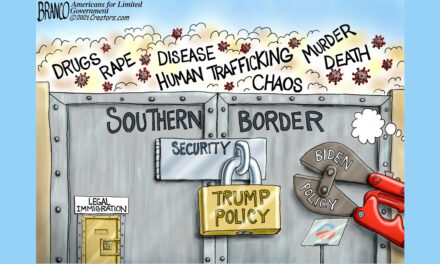
We Should (but will not) Abolish the IRS

We all know that the Internal Revenue Service is the collection and enforcement agency to collect the National Income Tax. Many folks may not know that the IRS is not the creature of our Founders. In fact, the IRS did not exist for the first 73 years of the American Republic.
It was created in 1862 to collect a temporary tax to finance the Civil War – on the northern side. It was a fixed 3% on those earning more than $800 per year – essentially eliminating most Americans from the tax. It was allowed to expire in 1872.
Different Supreme Courts ruled differently on the constitutionality of a direct income tax. That was settled in 1913, with the enactment of the 16th Amendment. It was initially a modest collection and accounting function — and a large percentage of Americans being below the minimum income requirement. From 1939 to 1945, however, the number of citizens required to pay the income tax rose from four million to 42 million – more than a ten-time increase in less than ten years. Today there are more than 148 million taxpayers – and a lot more who should be.
Rather than a taxing policy to meet needs, the ability to increase taxes has provided an enormous pool of financial resources to meet increasing political desires. The clever idea of “withholding” the tax from the paychecks was the means of not only guaranteeing payment, but a way to aestheticize workers from the pain of digging into their own pockets to pay the tax. Many experts have argued that without withholding, the public would never have tolerated the same level of tax increases we see today.
To coerce payment, the IRS was granted powerful enforcement policies. It could collect both interest and penalties on taxes not properly paid – in their opinion. It can seize bank accounts and property without due process – no requirement to sue in court where the taxpayer could mount a defense. Through the Department of the Treasury, the IRS has a police force that can raid and arrest – even licensed to kill. And Biden’s so-called Inflation Reduction Act provides an additional $78 billion for additional personnel for the IRS over the next eight years – almost doubling the current Agency budget.
No agency of government is more disliked and feared by law-abiding citizens than is the IRS. Do we really need the income tax to fund the government?
If we had another means – such as a National Income Tax –the IRS would not exist. We would never have to make out and file those needlessly complicated forms. We would never have to fear an audit – or have money and property seized. We would not have to fret over all those loopholes the rich and powerful use to reduce their tax burden.
There would be a saving to the taxpayers. Collecting a National Sales Tax would result in a drastic cost saving to today’s $15 billion IRS budget (not including the Biden money).
The way to do it is with a National Sales Tax (NST). Now we all know that sales taxes are regressive – tending to impact hardest on the lower income groups. That can be resolved by making the NST moderately progressive. That means no sales tax on basic foods, medicines and other essentials. High-end items would have a higher tax rate — luxury cars, expensive jewelry, designer clothes, fine wines, caviar, etc., etc., etc.
Middle class citizens could adjust their income by managing their purchases. The wealthy would bear not only their share of the tax burden, but a little more.
The government would not have to deal with millions of people in managing the collection. That would be handled by the businesses selling taxable goods and services. They would be collecting the tax at the time of purchase and sending on to the government. That is not even a totally extra burden on the business community since they already perform that service when they collect both state and local sales taxes. In fact, the business burden would be lessened by not having to withhold income taxes from employees.
In terms of downsides on the citizens, there is only one. It would require a significant increase in the price tag. Folks would have to really analyze that against their saving they receive with the elimination of the Income Tax.
Some argue that a National Sales Tax would open up another money pit for political avarice. That is why an NST should ONLY be enacted IF (🡨 big IF) … If the Income tax is eliminated by a constitutional amendment nullifying the 16th Amendment that created it. Otherwise, the critics are correct. The government would have another major means of fleecing we the people.
Now that I have your hopes up, I have to explain why it will never happen. Most of the IRS’s thousands of employees would need other jobs – and they would not be going quietly. Then there are those hundreds of thousands of independent tax accountants, financial advisors, tax preparers and tax attorneys – not to mention the tens of thousands of corporate employees in the tax departments — working with the accounting firms to search out the loopholes. And let us not forget all the lobbyists who focus on taxes – the men and women who propose the legislation creating exemptions and loopholes. Did I mention the money they donate?
The Income Tax may impose a horrendous burden on the American worker, but the industry is too big … too powerful … to be shut down – no matter how good the alternative may be. Try to find a member of Congress who would even introduce such legislation.
So, there ‘tis.


























Not gonna happen. The government wants as many thugs as possible. Even some of the republicans
Excellent post and topic Larry. Perhaps you should run for Congress! I would vote for you if the UAA and IFAC lets you live!
As an independent, I do see the chance for compromise here where we “transform” the IRS. And perhaps the key to the compromise would be a zero sum gain system where neither the Federal Government nor tax paying citizens gain. Compromise #1 (C#1) A tax preparation election method of either current tax method or a flat tax for all personal income taxes with no more than three rate categories, minimized deductions that do not favor industries such as home mortgage deductions, lower personal deductions, and the tax payer chooses each year which tax preparation method they will use. C#2) National sales tax to supplement Federal income lost by the flat tax linked to an amendment that the federal budget must equal total tax revenues. I would also lower FPL to the minimum SSA payment times 12 for a yearly income minimum. Below FPL you don’t pay tax but do complete a flat tax form. C#3) Businesses would still be able to use the current tax system if they choose, or pay a flat tax based on gross revenues. The benefits of such a compromise would be fairness with more people paying at least something, simplicity of reporting if you are a tax payer, minimal tax prep job losses and these folks could be put on a special program to train them to be Medicare/Medicaid Fraud Auditors, since the average fraud figure is around 6 to 7.5% (or $43 B/year in fiscal 2020) while VISA fraud rate is 0.5%. Most states do not have the resources to investigate and prosecute all of the fraud cases, which is why the rate of fraud is so high. These auditors could be paid by the Fed and stationed in each state to reduce fraud. For every $1 spent on oversight and enforcement to fight fraud, waste and abuse in Medicare, Americans can save between 5-$17 in return!! That’s a great deal!!!
And by the way, In total, Medicare improper payments were estimated to be $43 billion in fiscal year 2020. However, the amount of improper payments made in Medicare are significant, accounting for over one-quarter of the total amount of improper payments made government-wide in fiscal year 2019. See “https://www.gao.gov/highrisk/medicare-program-improper-payments”
Tom … Interesting thoughts … except for one. We should only go to a National Sales Tax if we constitutionally eliminate the Income Tax. If we give the Congress ANOTHER major finding source (income tax and borrowing), they would suck as much money as possible — and more — from all three of them. I have often said that if the Treasury Department found a billion dollars under a desk, all 535 members of Congress would EACH spend $1 billion. It is the nature of the beast. Government spending can only be restrained by hard legal limits.
Ok, I will buy getting rid of the income tax and going to a national sales tax as long as it is still zero sum gain, and people below FPL do not pay. The trick will be how to document that a person is below FPL in such a way that when they go to a cash register their status will be recognized by the register. Or maybe just not tax food, script and OTC medicines and personal hygiene supplies like toothpastes etc, Life sustaining DME supplies, etc. Didn’t the Europeans do something like this that they call a “Value Added Tax” (VAT)?
By the way, I have discussed with many of my peers ways of taxing wealth. One way we all liked was taxing stock transactions by the transaction order. The number of transactions being done by wealth management firm computers at lightning speed, and the wealthy by computer is phenomenal. Why should we be able to buy and sell stock and not have a sales tax on those kinds of purchase transactions? Maybe a flat rate like $1 per trade. Lets put stock buys and sells in the national sales tax schema. And let’s have luxury items taxed at a much higher rate. And lets lower the death tax to a floor of $125K per house above which you pay a flat income tax of $500 per each $125K of real estate value. These are just a few starting ideas.
No complexity or places to cheat in that. Oh look, I just got my fake FPL card that my crooked retailer accepts no problem as I begin to trade in larger batches to avoid the $1……
how about savings? gonna tax that? cuz that’s where the rich spend a lot.. or should I say under Larry’s plan —- shelter it. Probably take the banks a nano to create higher interest savings or better yet “investment savings plans” where you save, but can invest the money using the bank to do it, thus the $1 becomes a deductible bank expense.
it’s complex no matter how you do it, but when you start with a totally regressive plan, chances are you will not achieve a good level of fairness no matter how many band-aids you slap on top.
Ok. I gather you are in favor of the current system. That’s great! I support your right to maintain the rigged system! But as far as fake FPL card, lets refer to VISA which has a very low fraud rate. I put my VISA card into the gas pump, it gets authorization from VISA computers, then asks me for my zip. If anything seems wrong, it shuts down the transaction. Something similar can be done with a national ID card which could also be used for voting privilages as well as qualifications for programs. The national ID card could be placed in the chip reader and authorize the level of sales tax, as well as using zip as a check. The IRS knows by income how much a person or family spends on average per year. Once that threshold is reached the person then pays sales tax till the end of the year. If that threshold is reached more than two months in advance of the end of the year, they can be audited for hidden income, fraud, etc.
As far as high interest EFT savings accounts, again, the transactions would be billed to the account, not the bank. So the bank could not take the fee as a deduction. I know wealthy people but none of them I know of hide their wealth in low interest savings accounts. Some do buy art, precious jewels and jewelry, gold jewelry, antique cars, etc. but these could be taxed when sold or passed on as legacy to family.
I am starting to believe you do not want to pay what the government defines as your “fair share”!
“I am starting to believe you do not want to pay what the government defines as your “fair share”!” I am with Trump on this one and feel everyone should leverage the tax code as best they can, legally. At the same time, the “code” should seek fairness.
We all need taxes to run the country, but no likes to be taxed.
Fairness is based on what you pay in aggregate, not what you pay it on. What you pay it on will always pick winners and losers, the current scheme does in spades, Larry’s will do it to, probably not as severe as current.
IMO, the current version is really broken but workable, Reagan gave it a great start and we, again, went downhill from there. Every administration has added more to the code, more winners and losers.
IMO, Larry flat sales tax with benefits could be workable, but I doubt it and he’s a million miles away from proving me wrong.
One problem is the complexity. Larry is simple, we all can see that. But he didn’t even account for SS, Medicare, AMT, EUI, and the plethora of other taxes, mostly income that he needs to account for. I really don’t think you will unravel the current plan successfully. Reagan could not. But I think the best we could do is: 1) strip the code to more basic than Reagan, take every deduction and credit out. 2) add some back based on Congressional agreement like marriage, kids, education, farm subsidies, etc. The winners we agree upon for the good of our society and future. But a limited set. 3) place a severe restrictive process to add more 4) clean up Medicare and make it’s funding a sinking fund like SS, 5) monitor all loopholes annually before continuing each year, with metrics, so that things like subsidies don’t run past their point of providing a return.
Like Larry’s plan, my metric for success is simple: if the average American can do their taxes by themselves, if they have the correct info, in a couple of hours, then the plan might be acceptable. If they can’t, must have software, accountants, etc. then the plan is not acceptable.
That’s what I would do.
In Stetson world, if I could just start over, I would do what I said: tax based on discretionary income allowing nondiscretionary income to go untaxed. I would tax progressively. I would have certain limited deductions and credits. Discretionary income means income after basic needs funding are extracted. That’s a market basic of goods and services, sort of like Larry’s deductions, but broader in focus covering all basic needs. Then we would tax discretionary income progressively with higher brackets paying a higher percentage tax, up to 35% like the old days before 2012. Might even go to 70% until the debt is paid down like WWI and II.
I would fix Medicare funding mechanism to a sinking fund and not the General Fund, make SS whole for the future by raising age/$$$ limits, and retain a number of deductions, credits, and subsidies, given Congressional support, but extremely limited and scrutinized on a yearly basis before carrying forward. The basic needs exemption should also have yearly Congressional review.
The difference here is that you are not taxing income, you are taxing discretionary income making it fairer for the lower brackets to retain less money, but a higher percentage, than the rich —– not the current system which reverses that.
25b in 2021 for improper, down 20b.
Turned results in like that one year, boss said: “ can you do it again?”
Why didn’t u use current data?
“lets refer to VISA which has a very low fraud rate.” Yeah, is that before or after they attempt to fix. Because I get fraud every year, currently have four charges from a Netflix derivative being investigated. They will resolve, does that mean fraud did not occur? It sure looked like it happened to me…….. 50% of all Americans got hit over the last five years and $7 out of every $100 is fraud.
Sales tax is a regressive tax, that is, it impacts the poor much more than the rich. Let’s say your national sales tax is 10%. If I make a million dollars a year, chances are, 10% of that is not going to affect my living situation or the ability to eat or clothe my children or pay for my doctor’s bills. On the other hand, $4000 to a couple that only makes $40K between them is a pretty big chunk of money. They might have to choose to pay for food or medical bills in one month, or rent another month.
And instead of an IRS enforcing income tax, are you going to create a bureau of sales tax enforcement? Are you going to target farmers that sell at local markets and lock them up for selling without collecting the tax? And you’re going to create a huge market for used equipment and cars and clothing, unless you can find a way to tax personal sales. Or maybe you’re planning to do away with currency, and track everyone’s spending?
You state unequivocally that “everyone hates the IRS”, but most people are happy to pay their fair share of taxes for the services they get. The key phrase is “fair share” – the rich can legally (or illegally) cheat and not pay their fair share. THAT is what needs to be changed. The only real problem with the IRS has been that it couldn’t afford to go after the rich who don’t pay taxes. Before Reagan changed the tax rates, the ultra-rich paid up to 90% of their income in taxes, and that included ALL income. Since Reagan, the rich have slowly bribed their way into paying much lower tax rates than a normal working person does. It made Republican Members of Congress rich, and the already rich into obscenely rich.
Joseph S. Bruder … Here you go again … on another fanciful screed that has little bearing on the issues or my commentaries. I already addressed the issue of the regressive nature of sales taxes. Your examples are concocted nonsense. I guess if you can suggest that a 90 percent tax on the rich is a good idea, you are driven more by jealousy and class warfare than sound economics. Your attack on rich Republicans in Congress seems to overlook all those rich Democrats. Of the 10 wealthiest members of Congress 6 are Republicans and 4 are Democrats. It would seem personal wealth is bipartisan in Congress. Of the top dozen richest Americans — 9 are Democrats and 3 are Republicans. Two of them own major news platforms — Number 2 Bezos (Washington Post) and number 9 Bloomberg (Bloomberg news). So, can stop handing out 1960s tropes. You political opinions are harsh and strident, but not grounded in reality.
On the simple part, of course you can’t abolish the IRS. Even if you flat tax on sales, someone has to police the sellers for cheating.
As I noted before, taxation is generally based on income or revenue. Actually, you could tax almost anything including assets, investments, profits, even the right to drive automobiles. For the most part, income and revenue are the ones used primarily.
For most, the issue on taxation is how to achieve fairness. The problem is simple, the rich have more discretionary funds than the poor, either as a percentage or a value. Therefore, if you flat tax on income or spending, the rich pay more, but less on a percentage basis. That’s regressive. And the more you earn, the greater the regression.
An example: poor guy makes $100, rich guy $1,000. Flat tax is 10%. Basic needs, food, shelter, utilities, medicines average $90 for everyone even if the rich guy spends more for some of it like a bigger house, more heat, etc. The end result is poor guy has $0 left and rich guy has $890 left: is that fair?
Larry believes taxing spending is fairer, the first issue is that it’s extremely regressive. Therefore, he concludes: “That can be resolved by making the NST moderately progressive.” In this case, moderately resolved is equal to moderately pregnant. It is probably not resolved. He also plans to increase fairness by establishing a luxury tax which would help balance the books since rich people buy more luxury items than people. Unless of course they’re on welfare in which case they buy large screen TVs and Cadillac’s (just kidding).
The plan is simple but as Larry said before, taxation is very complex and the proof is in the pudding. Until we understand Larry’s basic needs basket that would be untaxed, the definition of luxury which would be a value added tax, we don’t have a clue how fair this is schema is. Not a clue.
It’s really hard for a consumption tax be fair given the poor consume so much more of their income than the rich. Larry even alludes to the unfairness when he says: “Middle class citizens could adjust their income by managing their purchases.” This is code word for unfair where Larry’s scheme has already picked winners and losers and he admits the middle class would be the loser by being forced to manage purchases in a manner they are not forced to today. For compensation, Larry recommends “The wealthy would bear not only their share of the tax burden, but a little more.” But he doesn’t tell us a little more of what. A little more percentage of the total tax than the current tax system offers? A little more tax than the middle class? We just don’t know except they will pay a higher tax, not necessarily a fairer tax.
Larry previously noted that taxation is complex. It is, and it should be in any vibrant economy. When I’ve seen, a simplistic plan like a national sales tax, even with undefined mediations attempting to emulate progressive schemas, they are unfair. I can’t say that Larry hasn’t cracked the code, he certainly hasn’t provided enough information for anyone else to assess his success.
Larry has also not addressed the issue of deductions and credits and one has to assume that his plan has none. Not sure how it plans to handle Social Security and Medicare. While deductions and credits are the hiding place of many a shameless loophole, they also contribute to what we think is important in our society like marriage, kids, and education. Larry erases all that and I believe a modicum is needed. I like using the tax code to incent behaviors we have almost unanimous help our country, culture, and society. I think marriage is good, why not incent? Kids are the future, why not incent? Smart kids are…..
No tax scheme will be totally fair and all tax schemes will pick losers and winners. I just think it’s better to pick on the rich than the poor, if you have to pick. I just think there are better plans that will get you closer to that goal and that Larry’s plan moves further away, perhaps even further than our current tax plan is today. But again, without more information, this plan is half baked. Now, let me see, can I bill the time it took to write this as charity?
There it ain’t.
Frank Stetson … I mentioned that the National Sales Tax would be collected by businesses — as they do not with sales tax and income withholding. Yes, there would still be a much smaller agency within the Treasury department to monitor corporate collection. But the millions of Americans would not be involved. ‘
Taxation is not necessarily based on income of revenue. It can be on almost anything … property … special use fees. I simply move the basis from income to sales. Of course those spending the most — those with the most income — will be paying the most taxes disproportionately.
You say my “plan” has no detail. I am offering a concept in which details would come out of negotiations in Congress. Your criticism has no more validity then my concept because the details are not known.
How could you support the idea of national health coverage when you did not know any of the details? You thought the CONCEPT was good. Same here. There would have to be extensive debate as to what goods and services are except and what get hit with surcharges. But that does mean the concept is not good for the American people.
“the National Sales Tax would be collected by businesses — as they do not with sales tax and income withholding.” You see, even you note they are not collecting sales tax and withholding.” :>)
OK, so you foresee a smaller IRS that the “millions” today with is actually about 80,000. And before you go off, Biden may add 20-30K over TEN years.
I agree and said, you can tax almost anything, I even gave examples.
Your retort is: “I am offering a concept in which details would come out of negotiations in Congress. Your criticism has no more validity then my concept because the details are not known.” Then why discuss? Just saying.
I had said: “When I’ve seen, a simplistic plan like a national sales tax, even with undefined mediations attempting to emulate progressive schemas, they are unfair. I can’t say that Larry hasn’t cracked the code, he certainly hasn’t provided enough information for anyone else to assess his success.”
IOW, maybe it could work, but I doubt it.
You create huge loopholes for the rich like savings, interest, and investment that you do not tax. You leave out current progressive elements like many deductions and credits like marriage, kids, and education. How do you handle IRAs? Municipal Bonds? You may have a vision, but the flat tax is severely regressive and, IMO, your progressive elements are window dressing and a scam.
But like you say, the proof is in the pudding, and I threw you the bone saying maybe you cracked the code.
Here’s where the rich spend their money and where you can see areas like your value added tax would never level the playing field to create a fair system. Note the huge savings element for example; can we call that spending?
https://www.businessinsider.com/how-high-income-and-low-income-americans-spend-their-money-2017-3
I did not say BUSTED but I have severe reservations that you could make a fair system via flat tax on sales with a few deductions tossed in fair to the lower income classes. Again, need more proof, but pretty sure you just dressed up the flat tax pig. IMO.
According to Brookings: “The tax reform panacea in vogue several years ago was the flat tax. This go around, it’s the retail sales tax. Advocates praise the simplicity, the potential for economic growth, the enforceability, and the fairness of a tax system based on consumption. But when examined closely, the simplicity breaks down, payments would be close to impossible to collect, and the tax’s fairness would be, at best, questionable. Nonetheless, more plausible consumption and income tax reform plans should not be ignored.”
Points for being trendy, God knows you love simple, and you gave up the Forbe’s favorite, the flat tax (just to replace it with a flat sales tax.)
https://www.brookings.edu/research/dont-buy-the-sales-tax/
Frank Stetson …. lol…. You got me on one of the worse typos because it reverses the meaning. I suspect you knew it was meant to be “now” — not “not.” But a good jab. I never had any doubt that a National Sales Tax would be controversial. There are winners and losers. Big government loses and the people win. I do like the flat tax, but it can be easily undone by Congress. The NST only works if you make it again unconstitutional. Folks who oppose the NST seem to be oblivious that a lot of taxing is already done through sales taxes. They seem to work well at the state and local levels. Why not at the national level?
“Big government loses and the people win.” I do not see a big government loss unless you plan to cut taxes too.
“The NST only works if you make it again unconstitutional.” this does not make sense; typo?
“Folks who oppose the NST seem to be oblivious that a lot of taxing is already done through sales taxes.” If you’re gonna snark, then at least be accurate. You don’t have a clue what opposers think about sales taxes. I oppose and know about sales taxes.
“The taxation debate is largely ideological. Those with larger paychecks might see the cons of taxing personal income. On the flip side, those who want governments to help shape society — and support investments in education or infrastructure — might favor an income tax.”
pro’s and con’s: “Pump prices in Washington are also among the highest in the country, in part because of a high gasoline tax. As of 2021, Washington charges 49.4 cents per gallon in gas taxes and fees, the third-highest in the country behind Pennsylvania and California, according to The Energy Information Administration.
Florida relies on sales taxes and has the 24th most affordable combined state and average local sales tax rate in the nation, while its property taxes are above the national average, according to the Tax Foundation. Tennessee has the highest average combined sales and local tax rates in the country, at 9.55 percent.”
“The benefits of living in a state with no income tax comes down to your personal finances”
https://www.bankrate.com/taxes/state-with-no-income-tax-better-or-worse/
It’s complicated but as a semi-retired, low income, high investment, having an income tax generally advantages me. Although, depending on sales tax exclusions, that might advantage me as well.
Winners and losers, always will have them. Complexity, always will be there, even if you have your way. Fairness, a constant battle but possible whether sales tax or income tax centered. IMO —- have them all with income being the main focus.
‘
We all know the famous Pelosi soundbite: “But we have to pass the [health care] bill so that you can find out what’s in it….
Here’s the sounds just before the bite: “You’ve heard about the controversies within the bill, the process about the bill, one or the other. But I don’t know if you have heard that it is legislation for the future, not just about health care for America, but about a healthier America, where preventive care is not something that you have to pay a deductible for or out of pocket. Prevention, prevention, prevention—it’s about diet, not diabetes. It’s going to be very, very exciting.”
For the braindead, WAPO provided even more context: “In the fall of the year,” Pelosi said today, “the outside groups…were saying ‘it’s about abortion,’ which it never was. ‘It’s about ‘death panels,’’ which it never was. ‘It’s about a job-killer,’ which it creates four million. ‘It’s about increasing the deficit’; well, the main reason to pass it was to decrease the deficit.” Her contention was that the Senate “didn’t have a bill.” And until the Senate produced an actual piece of legislation that could be matched up and debated against what was passed by the House, no one truly knew what would be voted on. “They were still trying to woo the Republicans,” Pelosi said of the Senate leadership and the White House, trying to “get that 60th vote that never was coming. That’s why [there was a] reconciliation [vote]” that required only a simple majority.
“So, that’s why I was saying we have to pass a bill so we can see so that we can show you what it is and what it isn’t,” Pelosi continued. “It is none of these things. It’s not going to be any of these things.” She recognized that her comment was “a good statement to take out of context.” But the minority leader added, “But the fact is, until you have a bill, you can’t really, we can’t really debunk what they’re saying….”
IOW, the SENATE had to pass a bill before the HOUSE could see what’s in it, to further the debate and move the appropriate, well-read, SENATE version to the HOUSE for debate and passage.
History tell us that not only would the BILL pass the test of time but that REPUBLICANS who said “it will be easy,” could not undue it but more important, could not enhance or even replace it with anything better. Turns out Pelosi was right, Republicans were incompetent to do better. Still are.
Come on man, you’re better than that. You must have looked deeper at one point.
Still a stupid way to say it, even she admits that, but out of context, and the clarification explains what she was attempting to communicate.
I would whatttabout you with some Trumpisms, but that’s rearview thinking and I don’t want Sam to get excited thinking about rear views. :>)
Sorry larry, i did respond to your comments beyond the pelosi red herring, but links need moderation and that takes time. Yet the n word sails right through. Sigh.
Larry, still promoting this stupid idea? Are you actually rooting for the ruin of the nation? As has been pointed out, sales taxes are inherently regressive. You want to help that by eliminating some necessities such as food from the items being taxed. That helps the poorest people to a degree (but only a degree) as it increases the tax rate for the items you deem “non-necessities”. You then say that the middle class can then adjust their taxes by choosing what to purchase. Two major problems with that: 1) they don’t purchase as many items, so fewer taxes are collected, so tax rate again has to increase, 2) they don’t purchase as many items and companies have to reduce staffing, poor and middle class people get laid off, welfare increases and additional taxes are required to pay for that. Are you really that illogical that you can’t see how the national sales tax is a non-starter to replace the income tax? The income tax is the only truly fair way to have a progressive tax system in any country, and unfortunately there are lots of tax cheats (particularly at higher income levels) which is why they need additional funding that the IRA contains. And yes, like any law that is written, there are problems that legally allow the rich to avoid taxes, but many of those were “benefits” of the 2017 tax law written by the republicans and they refuse to touch those….
Mike F … Only a stupid person would call the idea of a National Sales Tax “stupid.” You explanation of how it would work proves you know virtually nothing about the NST or how taxes work …. period. In fact, you preference for the income tax is odd since it has created all the unfairness you seem to oppose. Also you are wrong when you say that those obnoxious “benefits” were put into the tax structure by Trump. They have been part of the systems for generations. What you call cheating is mostly folks taking advantage of legal loopholes. They are not cheating because the income tax is inherently unfair.
Uh, they are not cheating because it’s legal.
The tax system is not inherently unfair, it has been made to be unfair.
One of Trump’s targets was NE democrats. No wonder he moved to FL. I’m pretty sure it’s a Ryan clause but they figured out where the high property taxes were and capped the deduction so lower incomes would escape, a lot of the country outside the NE would escape. So, basically the bigger properties in the NE got screwed. That’s some pretty narrow targeting. Winners and losers. And a tax system made more unfair by cutting taxes of all things. Not mine though.
IMO, a progressive tax based on income is inherently more fair than a flat tax on consumption. However, both can be made more fair via added elements, as Larry has. Still doesn’t change the inherent foundation from being less fair.
The math is ez to show which is more fair at the foundation. It’s also discussed in the links.
So the demented president got caught with classified documents? Wow!!! Let’s get the fbi , cia. sheriff department, state police or the Boy Scouts involved. Not a single thing will be done about it. Just like fast and furious under Obama the Kenyan. And the true patriots that have control of the house are trying to stop government agencies from being weaponized. Oh boy!!!! Are the democrats raising hell? But I suggest we wait until Biden leaves office and then have the handcuffs ready. And don’t forget the Chinese deals and his crooked son. But like I said. Nothing to be done. That’s exactly why I will never comply with democrats laws. And don’t forget Hillary. I know. No proof. Her thuds.thugs knew how to scrub phones and computers. Viola!!!!! No proof. If reasonable people don’t believe that we as a country are headed for ruin, you need to remove head from your ass and clean your ears.
Apparently, Clifford can’t spell IRS….
The difference is he found them, turned them in after informing the archives.
Trump stole them, hid them, lied about having them, Fake returned them, lied again, and then they found more in another place.
Yeah, it’s the same thing.
If trump lied he learned how from the democrats
Paul nakes no sense. Trump was a democrat for most of his life, genius. Maybe he taught them.
At the last count, our current Tax Code was 74,608 pages of rules & regulations nobody can understand, enforced by an agency nobody seems to trust!
Could you thoroughly learn and retain the contents of over 74 reams of paper, printed on both sides, could anyone? (a ream of paper is a bundle of 500 pages)
Americans are rightfully frustrated with the complexity of the 74,608-page-long federal tax code. The federal tax code is 187 times longer than it was a century ago. As of 2015, federal tax laws and regulations had grown to over 10 million words in length. This figure includes the federal internal revenue code (2,412,000 words long) and federal tax regulations (7,655,000 words long).
Americans spend 9 billion hours every year complying with the tax code, which costs them more than $400 billion in lost economic productivity.
There are untold Billions of man-hours wasted, and legions of people employed just to comply with the blasted thing!
THE DEAD TREE LEADERS
Surprisingly, Treasury, with an almost countless number of tax forms (there are roughly 1,500) is not the runaway leader in federal paperwork. Although it imposes the greatest number of paperwork hours, it is actually just fourth in the federal forms race, behind HHS and the Department of Agriculture. Anyone who has ever spent an hour filling out forms before a doctor’s appointment can attest to the weight of HHS paperwork. Now, there is a number behind these anecdotes: 5,005 forms or 34 percent more than the next closest agency.
Dementia joe thought that the documents were whacking material
OMG you struck a cord there. Not only HUGE, but check out the growth rate post 1970.
Interesting read here on the subject: https://taxfoundation.org/how-many-words-are-tax-code/
+1 on your post
The one big problem with taxing the high-priced stuff is that the wealthy could just go buy the items in another country. Let’s say a working class man needs a suit. He goes and buys a cheap suit that may be tax-exempt for a couple of hundred dollars. The wealthy man wants a $5,000 suit, so he flies to Italy, buys one, and brings it home. No US sales taxes on that. The wealthy man wants a multimillion dollar home, he buys one in France, not the US. The same could apply to cars. Expensive German or Italian cars could be bought in the nations that made them. No US sales taxes. The working class Americans have no such recourses, so they will be taxed more on their dollars than the wealthy, even though the wealthy may spend ten to a hundred times as much, just not in America.
Rat Wrangler … I would make two points that counter your contention. First, you assume that wealthy people look for bargains. If there were true they would not pay $100 for a designer t-shirt when they could get one for $10. Also, to go Italy, a wealthy person would have to spend more taxable dollars than the suite would cost in taxes if locally purchased. Also, there are taxes on imported cars and a lot of expenses that would be taxable in getting them move. Under a National Sales Tax, the middle class would realized a overall tax saving with their total annual sales tax being slightly less than what they pay in income tax. It would also end the ability of the wealthy to pay no taxes. That is huge.
How can you know that based on the detail provided?
And what’s the overall tax revenue change? You gonna make the shortfall up in volume ? 😉
If you tells us the rich will make up the difference, we don’t want to buy that bridge.
Larry/Tom, like I said you can tax anything and I suggest we tax everything. I mean you admit it’s complex, why not revel in the complexity. I honestly don’t think you can avoid it. For example, because of our Constitution, we have opted to fund public services like Social Security and Medicare through tax mandates. And to add to the complexity, SS is an untouchable sinking fund that we borrow upon that funds our debt. Medicare is a tax mandate but the actual funding comes from the General Fund, not sinking fund, and certainly touched every year. Now that’s complex. At this point, you just can’t avoid that.
Since Reagan, who got us to our lowest complexity level, every President has added more loopholes starting with Bush I and missing not a single administration. With every loophole comes a winner and loser, so they are all over the code now. I love one of the first loopholes post the Reagan cuts, the Bush health care reimbursement. It gave you cash back based on expenditures from a sinking fund that you filed expenses against which later you would deduct from your current year’s deductions. That’s the easiest definition with the fewest words. Guess how many rednecks were going to capitalize on that one…. Well, I was one and I have an MBA and it takes work: watch this.
Let’s say the maximum you can deduct is up to $2,500 BUT you have to commit to a number during benefit signup in November of the previous year because it’s tax pull from your salary (IE if you don’t work, you are a loser). Number one, you have to figure in advance how much of 2,500 you will spend next year and then you commit to that number, let’s say 2,000. Now your salary is gigged, 2,000/12 each month into the sinking fund. During the year your can deduct from that, even in advance. Paperwork to file in yet another filing place. Oh yeah, and if you don’t file against the full 2,000, you lose the residual at the end of the year. Complex? Must be because few took advantage of this loophole even though everyone who works can, even today. That was the Republican healthcare plan under Bush. OK for the salary-class, but pretty tough for Joe-six-pack to take advantage of and certainly not fair.
I guess your tax plan avoids this meaning I will be taxed on $2,500 more each year, tyvm. Let me guess, Larry has that covered by the work Congress will do. Good luck.
And how about credits? I love energy credits, they incentivize renewable usage as well as using less energy via improvements like lower-usage appliances, ac, and home improvements like insulation. Yes, it picks winners and losers, but I like the win here so I like the concept. I take it your plan avoids this.
Bottom line: I think our progressive taxing is a good form but overwhelmed by decades of loophole additions. We need to strip it to Reagan-level or better simplicity and then, transparently, add back any deductions and credits we feel incentivize behaviors we agree our society should as well as help level the fairness of the plan. THEN, for each think we add, by law we should monitor or manage for change since all things change over time and today’s “fairness deductions” can be tomorrow’s giant loophole for some group. (aka subsidies). I think that’s the better way, but doubt it can ever happen. There is only one Ron Reagan. Trump may have slashed and burned the code, but the loopholes remaining are still overwhelming and, IMO, personally, it was made less fair for me. Always winners and losers, no matter what you do. All you can do is minimize, monitor, and control when needed.
This is not my preferred tax plan, I would rather do the same thing but focus on discretionary income and not full income. IOW, pick a magic number for basic needs (like Larry’s sales tax exclusion numbers) and deduct that from income. Now what is left is discretionary income and that’s what I would love to see taxed. I would also like to tax all income forms the same; I am an investor and am chagrined every time I get a tax break for the “risk” I take sitting in my pj’s reading the laptop. Just does not seem equal to the financial risk the coal miner is taking.
Beyond that: make it progressive, gig the wealthy like we did in the past, like even Reagan’s numbers are better than current, and after stripping the loopholes begin to add some back the we all agree are good for the nation, good for our society —- like marriage, kids, and education. There will be more but we need to 1) put a cap on how many and 2) monitor each year for potential update or deletion. Loopholes, deductions, credits can not just continue forever —- they must be actively managed.